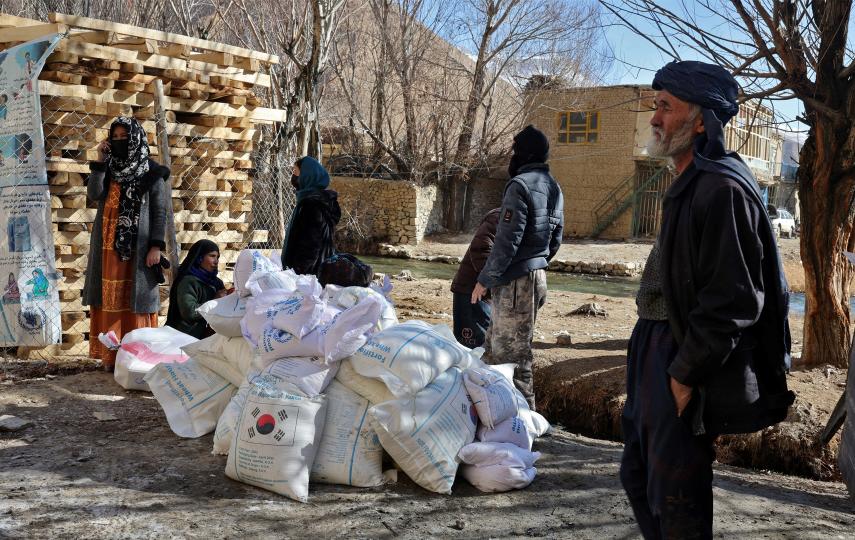Is the humanitarian sector regrouping, renewing, resetting, or reforming? It’s not particularly clear yet.
This is Inklings, where we explore how aid works in the wilds of Geneva, on the front lines of emergency response, or in the dark corners of a Slido Q&A.
It’s also available as an email newsletter. Subscribe here.
Today: The Great Reprioritisation, Israeli aid killings, UN mergers, the Kristof effect on mutual aid, and other tidbits from Humanitarian Networks and Partnerships Week.
On the radar |
UN relief chief Tom Fletcher framed this week’s nearly concluded HNPW conference as a chance to “regroup and renew” amid the sector’s existential funding crisis. Days of panels, sideline chats, and an odd keynote session at Humanitarian Networks and Partnerships Week in Geneva show a system still at the drawing board.
That Amazon keynote: Some have tried to graft an air of import and urgency onto what’s usually a slightly wonkish event – more school science fair than high-stakes summit. Many of the 300+ panels were organised months ago during aid’s Before Times. This year, the UN’s humanitarian aid coordination arm, OCHA, added a new keynote address with an ambitious tagline: “The Future of the Humanitarian System”.
But some attendees were miffed by the inclusion of a director from Amazon Web Services (AWS), said to be representing the nebulous “private sector”. Organisers polled the audience for online questions, which were to be voted on then asked live. “How much did Amazon receive in tax breaks last year from countries in the Majority World?” asked Matt Kletzing, a former aid worker and director at United Edge, a UK-based social enterprise. Kletzing said his question appeared on-screen briefly then vanished (his question and 135 others were still live on Slido the next day).
“Not a single question was asked that questioned power in the sector,” Kletzing told us in a DM on 2025’s premiere doomscroll app, LinkedIn. “While paying lip service to localisation, we give the platform about humanitarian system change to one of the richest companies on the planet.” His LinkedIn post on the subject, Kletzing said, is “exploding a bit”.
Read more: AWS makes a cameo in this opinion piece: The problem with emergency aid’s growing reliance on corporations
Ideas for change? Others we spoke to who caught the keynote live said they were hoping to hear bolder ideas on reform or next steps. Here’s a smattering of what other panellists said:
Lynn Hastings, former UN resident and humanitarian coordinator for Israel and the Occupied Palestinian Territory: “We seriously need to take a look at how we merge UN agencies, national NGOs, and international NGOs. We all know what that entails. There's fierce competition, but… I think a number of our agencies or organisations will die through financial attrition, if we can call it that, if we don't sit together and figure out the overlap and competition issue.”
Anna Maria Socorro Abalahin, Caucus of Development NGO Networks, the Philippines: “The system has created a donor dependency / donor-driven system that, in the end, it actually robbed opportunities for local actors to really show the capacity they have.”
Duncan Onyango Ochieng, National Disaster Management Unit, Kenya: “You find that the donors do fund very big organisations and decisions are made elsewhere. By the time this is trickling down… you realise that all the funds have been utilised. For the purposes of reporting, the organisations will always report perfectly, as required by the donors. But on the ground, things are very different.”
What is lifesaving? The Great Reprioritisation is under way, and so is the internal wrangling over how to cut budgets (again) to fit donor cutbacks. This means the return of a question that may trigger memories of USAID waiver exemption chaos: What is lifesaving? Some worry that a back-to-basics approach may emphasise the type of aid that helps people survive but little else. OCHA’s Gemma Connell, seen as the organisation’s prioritiser-in-chief, pushed back:
“I’ve heard so many people over the last weeks saying ‘Lifesaving means you’re going to do water trucking’ – no it doesn’t,” Connell said during a panel touching on prioritisation. “You can meet the life-threatening need for clean water with a borehole. You can meet the lifesaving need for food with emergency agriculture. You can meet life-threatening needs with multi-purpose cash which enables people to choose. You can do all of that, and it’s lifesaving. So let’s not allow ourselves to see lifesaving as a bad word.”
Number crunching: Efficiency and value are all the rage in 2025. A couple of job role titles spotted at HNPW: “focal point for value for money” and “best use of resources technical lead”.
Israel’s aid killings: Israeli forces appear to be targeting aid workers as part of their destruction of Gaza and its people, as The New Humanitarian’s reporting shows. A tank strike on a UN compound this month killed another aid worker, and seems to have pushed the UN to reduce its staff footprint. Aid organisations have long said that Israel continues to kill humanitarians and health workers despite participating in deconfliction or notification systems, which are meant to reduce the risk of strikes by alerting armed groups of humanitarian whereabouts.
A few questions raised at HNPW sessions: Should security specialists recommend not participating in notification systems? Are aid groups prepared to stick together and pause operations as a negotiating tool? And if Israel is blocking all aid from entering Gaza anyway, when does leaving become the choice for international aid groups, who prefer to preach the doctrine of stay and deliver?
Name branding: Israeli forces have reportedly been targeting white pick-up trucks, which led to this security advice for aid workers in Gaza: Avoid Toyotas.
The Kristof Effect: Columnist Nicholas Kristof’s reporting can be divisive for journalists and aid workers alike. But the New York Times journo has a wide reach, as people raising funds for Sudan’s emergency response room volunteer groups have discovered. The Mutual Aid Sudan Coalition started up last year to steer money to Sudan’s grassroots volunteer groups. The coalition saw a flood of donations adding up to $430,000 after a brief Kristof mention in the comments section of a September article. Another unexpected mention sparked a $200,000 surge this year. The coalition says it has raised $3 million in total so far. The obvious follow-up question: Are we about to discover the monetary value of “The Inklings Effect”?
Doppelgänger: The Mutual Aid Sudan Coalition is not to be confused with another grouping called the Coalition for Mutual Aid in Sudan.
Data points |
Fletcher’s humanitarian reset pledges to accelerate “community feedback to improve our accountability”. But listening to people has never been the sector’s strength. Ground Truth Solutions has a new report looking at what crisis-hit communities might want from a humanitarian reset.
A couple of datapoints stand out. Most respondents in the group’s ground-level surveys say they’ve never been asked to help decide how aid is used:
And when they are asked, many say their input is largely ignored:
End quote |
“Early ideas for change are modest but generally positive. The larger problem is not simply what’s being proposed but who is being asked to deliver them.”
Fletcher’s letter describing his vision for a reset added some detail to what he’s previously referred to as a ”humanitarian communications room” drawn from across the sector to “make the case to sceptical audiences” (or to define the humanitarian narrative amid the Trump attacks, one might say).
“The attack will be that we are a wasteful, divided, bureaucracy,” Fletcher wrote. “We will need to be – and demonstrate that we are – efficient, united, independent, and saving lives.”
There are many reasons why aid organisations have been slow and still reluctant to speak about US aid cuts – the perceived fear of retribution from a clearly vindictive US regime, among them. There’s also a sense of wanting to avoid appearing divided in the face of an existential threat, some aid leaders say.
But this silence trickles down through the system, and reinforces the status quo.
What Fletcher has said publicly about the reset is mostly in the form of two letters to the Inter-Agency Standing Committee principals. This is a grouping dominated by UN agencies with a rotating cast of big NGOs. It has a coordination mandate, but not necessarily a leadership one. It’s not particularly representative of the breadth of the humanitarian system.
Its meetings or deliberations are not public. The degree to which information is shared beyond this circle depends on individual agencies, network members, and Fletcher’s tweet threads.
Watching your words may well be a defendable strategy in the all-caps era of Trump and Musk. But it can also have the effect of consolidating power, shutting out those who don’t have a seat at the table.
During the first weeks of Trump 2.0 chaos, smaller organisations and grassroots aid groups were desperate for basic information and a sense of a collective strategy. UN agencies in particular did not share information, several aid workers told us. It took a month for something public to emerge at the IASC principals level (after a meeting that some members skipped).
But even if the IASC principals are a little opaque, or if events like HNPW aren’t satisfying fora for the future of humanitarianism, substantive discussions are happening elsewhere: local organisations comparing notes on how to wean themselves off the international system; diaspora groups figuring out how to use their ample collective resources; governments that receive aid making new budget plans, for example. One problem is how to tie it all together.
As contributor Lydia Poole recently wrote: “The leadership needed to navigate this crisis will have to come from elsewhere.”
Have any tips, recommendations, or indecipherable acronyms to share with the Inklings newsletter? Get in touch: [email protected]





